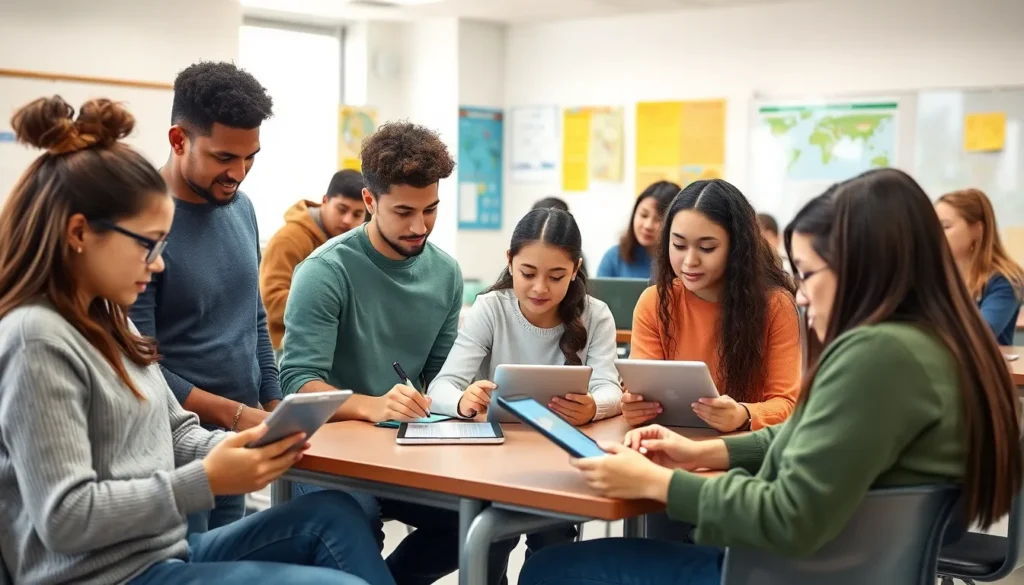In a world where one-size-fits-all solutions often fall flat, adaptive learning swoops in like a superhero ready to save the day. Imagine a classroom that tailors itself to each student’s unique needs, like a custom-fit suit but without the awkward fitting room experience. This innovative approach transforms education from a monotonous lecture into an engaging journey, making learning as enjoyable as binge-watching the latest hit series.
Table of Contents
ToggleOverview of Adaptive Learning
Adaptive learning represents a revolutionary approach to education focused on individual student needs. It enhances the learning experience through personal customization, making education more effective and enjoyable.
Definition and Importance
Adaptive learning involves using technology and data to create personalized educational paths. This model adapts content in real-time based on a student’s performance and learning pace. Tailoring learning experiences promotes better engagement and strengthens knowledge retention. Studies show that adaptive learning can improve student outcomes by up to 30 percent, emphasizing its growing importance in modern education.
Key Features of Adaptive Learning
Several key features define adaptive learning systems. Customization allows lessons to alter according to student abilities. Real-time feedback provides immediate insights, helping learners understand their mistakes. Integrated assessments identify knowledge gaps, offering targeted resources for improvement. Collaborative tools foster interaction among learners, enhancing the overall educational experience. These elements work together to create an effective and personalized learning environment.
Types of Adaptive Learning Systems

Adaptive learning systems come in various forms, each embracing distinct methodologies that enhance personalized education. Organizations and institutions implement these systems to meet the unique needs of learners effectively.
Data-Driven Approaches
Data-driven adaptive learning systems leverage analytics to tailor educational experiences. These systems collect performance data and identify strengths and weaknesses of each learner. With this information, they customize content delivery for maximum effectiveness. Real-time feedback allows educators to adjust teaching strategies rapidly. For instance, platforms use algorithms to analyze student interactions and suggest targeted resources. Such approaches maximize student engagement and outcome improvements, demonstrating a potential enhancement of up to 30 percent in learning efficacy.
Learner-Centered Models
Learner-centered models prioritize the individual needs of students. In these systems, the emphasis remains on personalizing the learning path based on preferences and progress. Each student’s experiences shape their educational journey, promoting autonomy and self-directed learning. Various tools enable collaboration, ensuring students can engage effectively with peers and instructors. Some programs integrate gamification elements, enhancing motivation and retention of concepts. Altogether, these models foster an environment where learners take charge of their education, contributing to greater satisfaction and success.
Benefits of Adaptive Learning
Adaptive learning provides significant advantages in education. This method personalizes learning, catering to every student’s specific needs and preferences.
Personalization of Learning Experience
Customization plays a crucial role in adaptive learning. Each student experiences a tailored curriculum focused on their strengths and areas needing improvement. Learning paths adjust based on real-time feedback, ensuring materials resonate with individual capabilities. Through adaptive technologies, students engage in ways that work best for them, promoting a deeper understanding of concepts. The integration of collaborative tools further enhances this experience, allowing learners to share insights and strategies, which enriches the educational environment.
Improved Learning Outcomes
Enhanced educational results frequently accompany adaptive learning. Studies show that tailored approaches can boost student performance by as much as 30 percent. Real-time assessments and analytics pinpoint knowledge gaps, allowing educators to modify strategies quickly. Immediate feedback helps learners correct mistakes and reinforce understanding effectively. Increased engagement often leads to higher retention rates, positioning students for long-term success. Adaptive learning environments foster a sense of agency, as students progress at their own pace, ultimately leading to greater satisfaction and achievement.
Challenges in Implementing Adaptive Learning
Implementing adaptive learning presents several challenges that educators must navigate effectively.
Technical Challenges
Technical challenges frequently arise during the deployment of adaptive learning systems. Integrating advanced technologies with existing educational infrastructures can be complex. Data security concerns affect many institutions, especially regarding student information. Inconsistent internet access can hinder the effectiveness of online adaptive learning tools. Not all educators possess the necessary technical skills to utilize these systems fully. A lack of reliable analytics tools complicates the evaluation of student progress. Additionally, maintaining and updating adaptive learning platforms requires ongoing investment and resources.
Resistance from Educators
Resistance from educators often poses a significant barrier to adopting adaptive learning. Many educators feel comfortable with traditional teaching methods and may hesitate to change their practices. Concerns about job security can arise, as adaptive learning technology automates certain instructional tasks. Some educators question the effectiveness of data-driven learning, believing personal interactions lead to better outcomes. Training and professional development play crucial roles in easing this resistance but may not always be readily available. Overall, addressing these concerns is essential to fostering an environment where adaptive learning can thrive.
Future Trends in Adaptive Learning
Adaptive learning continues to evolve, driven by technological advancements and the changing landscape of education. Emerging trends highlight the growing potential of personalized learning experiences.
Integration with Emerging Technologies
Integration with cloud computing enhances the capabilities of adaptive learning systems. Artificial intelligence plays a critical role by analyzing data and providing tailored content. Virtual reality and augmented reality create immersive educational experiences that adapt to individual learning styles. Machine learning algorithms refine educational materials based on real-time feedback, allowing educators to optimize instructional methods. Overall, these technologies enhance engagement and retention, making learning more interactive and effective.
Expansion in Educational Settings
Expansion in educational settings accelerates the adoption of adaptive learning systems. Schools and universities increasingly incorporate personalized learning approaches to address diverse student needs. This shift fosters a culture of individualized instruction, allowing educators to cater lessons to different learning styles. As institutions seek to improve student outcomes, adaptive learning solutions gain traction across K-12 and higher education. Notable partnerships between tech companies and educational institutions promote widespread implementation, ensuring broader access to adaptive systems. Consequently, students benefit from tailored educational experiences that support their unique learning journeys.
Adaptive learning represents a significant shift in educational practices. By focusing on individual student needs and leveraging technology, it creates a more engaging and effective learning environment. The benefits of personalized education are clear, from improved student outcomes to enhanced knowledge retention.
As educational institutions continue to embrace adaptive learning, the integration of advanced technologies will further enhance its effectiveness. Overcoming challenges related to implementation will be crucial in maximizing its potential. The future of education is bright with adaptive learning at the forefront, promising a more tailored and fulfilling experience for every learner.








